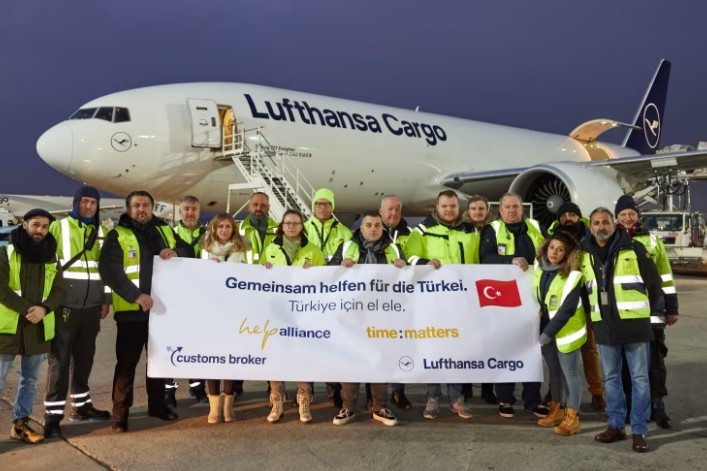Air cargo industry provides Turkey-Syria earthquake aid

The air cargo industry has stepped up to transport humanitarian aid and supplies to victims of the devastating Turkey-Syria earthquake that hit on February 6.
The 7.8 magnitude earthquake struck close to the Turkish city of Gaziantep near the Syrian border, causing extensive casualties and deaths as well as damage to buildings and infrastructure.
A Lufthansa Cargo Boeing B777 freighter loaded with relief supplies departed Frankfurt today for Fraport TAV Airport Antalya.
The Lufthansa Cargo subsidiary time:matters, which specialises in emergency logistics, and its customs service provider, CB Customs Broker, organised the relief operation together with Lufthansa Cargo.
Lufthansa Group employees who volunteer in the FRA Community of the HelpAlliance, the Lufthansa Group’s non-profit relief organisation, have been supporting Lufthansa Cargo since Wednesday evening in consolidating and preparing the cargo for this free relief flight.
The Lufthansa Cargo team in Istanbul is in close contact with the disaster relief organization AFAD, which will receive the relief supplies after landing and bring them to the crisis area.
The freighter took off fully loaded with relief supplies, mainly winter clothing, blankets, food and hygiene items, which are most urgently needed on the ground.
The donations in kind came from Turkish communities in Hesse and Baden-Württemberg, from companies in the region and from Lufthansa Cargo employees.
“We are deeply affected by the extent of the destruction in the Turkish-Syrian border region and want to help. The willingness of our employees from the Lufthansa Cargo environment and the Help Alliance to help is enormous, and plans were made immediately to organize a relief flight as quickly as possible,” said Dorothea von Boxberg, chairwoman of the executive board and chief executive of Lufthansa Cargo.
“As an emergency logistics provider, we have already gained a lot of experience in dealing with such events during past crises and disasters. Thus, we were able to operationally prepare this cargo flight with urgently needed relief goods within 72 hours with our professional teams. ” said Alexander Kohnen, managing director of time:matters.
Turkish Cargo
Turkish Cargo is also taking part in aid operations. The airline said in a LinkedIn post on February 7 that it is delivering supplies and equipment using five freighters.
“After the earthquake in Kahramanmaraş and the surrounding provinces, we are transporting the collected medical supplies and search and rescue equipment to the region with our cargo planes.
“While delivering the equipment to the region with our 5 cargo planes planned from Istanbul, Sabiha Gökçen and İzmir Adnan Menderes Airports, we deliver the materials sent through the relevant organizations of our state, especially AFAD, to the earthquake regions.”
Emirates operation
Emirates is setting up an airbridge with Dubai’s International Humanitarian City (IHC), to transport urgent relief supplies, medical items and equipment to support on-ground aid efforts and search and rescue activities in both countries.
The first shipments are due to go out today on EK 121 and EK 117, consisting of high thermal blankets and family tents from UNHCR, followed by World Health Organisation (WHO) and World Food Programme (WFP) relief cargo of medical kits and shelter items, co-ordinated by the IHC in Dubai.
In the coming days, more consignments of blankets, tents, shelter kits, flash lights, water distribution ramps and trauma and emergency health kits will be transported on Emirates. Emirates SkyCargo plans to dedicate cargo space for around 100 tonnes of humanitarian relief goods over the course of the next two weeks across its daily flight operations to Istanbul.
Operational update
Additionally, Air Charter Service (ACS) said on its website that it “has arranged several charter flights carrying search and rescue personnel, equipment and trained rescue dogs”.
The charter company added: “We have arranged some early flights carrying humanitarian relief cargo, and are expecting a further influx once the teams on the ground have made their assessments.”
“There is currently good aircraft availability to get cargo to the region. From US we have a reasonable number of B747, B777, and B767 aircraft that can all get into larger airports such as Istanbul (IST), Istanbul Sabiha Gökçen (SAW), Adana (ADA),” the charter broker said.
“From Europe we have similar large aircraft available, with the addition of smaller B757, B737, and AN12. From the Middle East we have the addition of the Ilyushin 76 aircraft which can land and be offloaded independently if necessary.”
On airport operations, the company said that Hatay airport was closed and there was limited offloading equipment at Gaziantep and congestion was likely.
The IHC and World Health Organization (WHO) have also joined forces to organise airfreight aid.
A first cargo plane bound for Istanbul departed from Al Maktoum International Airport on February 8, transporting 37 tons of medical kits, said IHC.
Additionally, IHC is facilitating another relief flight to Syria to support international humanitarian agencies in delivering additional tons of crucial aid, which includes medicines, and other essential supplies.
Air Cargo News understands an MNG Airlines aircraft was used for the Istanbul flight and a Moalem Aviation aircraft was used for the Syria flight.
CMA CGM Air Cargo
The CMA CGM Foundation is also mobilising its logistical expertise to help the affected populations.
A CMA CGM Air Cargo A330-200F aircraft, made available free of charge, will take off on Sunday from Paris-CDG to Gaziantep airport to transport a field hospital deployed by the French Civil Security.
“This new emergency aid operation will be carried out within the framework of the partnership between the CMA CGM Foundation and the Crisis and Support Center of the Ministry of Europe and Foreign Affairs,” the company said.
In addition, the CMA CGM Foundation is preparing its contribution to a humanitarian operation for the populations affected by the earthquake in Syria, in conjunction with non-governmental organisations and the United Nations.
